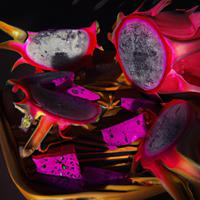
1 serving (100 grams) contains 60 calories, 1.2 grams of protein, 0.4 grams of fat, and 13.0 grams of carbohydrates.

Log this food in SnapCalorie

Nutrition Information
Calories |
142.9 | ||
|---|---|---|---|
% Daily Value* |
|||
| Total Fat | 1.0 g | 1% | |
| Saturated Fat | 0.2 g | 1% | |
| Polyunsaturated Fat | 0 g | ||
| Cholesterol | 0 mg | 0% | |
| Sodium | 0 mg | 0% | |
| Total Carbohydrates | 31.0 g | 11% | |
| Dietary Fiber | 7.1 g | 25% | |
| Sugars | 19.0 g | ||
| protein | 2.9 g | 5% | |
| Vitamin D | 0 mcg | 0% | |
| Calcium | 42.9 mg | 3% | |
| Iron | 1.7 mg | 9% | |
| Potassium | 261.9 mg | 5% | |
* Percent Daily Values are based on a 2,000 calorie diet. Your daily values may be higher or lower depending on your calorie needs.
Food Attributes
Source of Calories
About Dragonfruitssss
Dragon fruit, also known as pitaya, is a vibrant tropical fruit known for its bright pink or yellow skin and speckled white or red flesh. Native to Central America and now widely grown in Southeast Asia, dragon fruit is cherished for its subtly sweet taste and refreshing texture. Rich in vitamin C, antioxidants, fiber, and essential minerals like magnesium, this fruit supports the immune system, aids digestion, and promotes healthy skin. Its high water content makes it hydrating and low in calories. While dragon fruit contains natural sugars, they are present in moderate amounts, making it suitable for most diets. Adding dragon fruit to smoothies, salads, or enjoying it fresh as a snack highlights its versatility in cuisines worldwide. With its striking appearance and numerous health benefits, dragon fruit is a delicious and nutritious choice for anyone seeking a flavorful boost to their diet.



